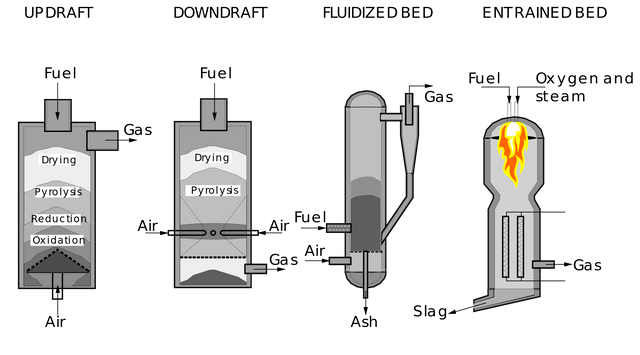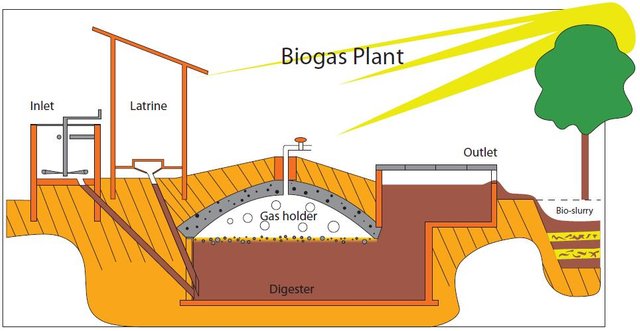BIOMASS TO BIOGAS: YET ANOTHER FIELD UNEXPLORED WITH PROOFS
2005, the year I first came across the word, biogas. The idea of turning waste into energy, energy safe enough to make meals, strong enough to produce electricity. It sounded nothing short of a miracle to me, I was fascinated, I still am. I can remember the grin on Mr. Peter's face, my Intro Tech teacher. A grin that stretched from one of his earlobes to the other, a result of the excitement of a new knowledge he was sharing with a bunch of JSS2 kids. It was nothing short of heroism, Mr. Peter's endeavor to explain bogus concepts like, Anaerobic digestion, fossil fuel, bio slurry, renewable_energy, and a number of other cumbersome words, to a group of people in their first years of teenage hood.
He did a good job, so good, that I carried out a number of failed experiments at home, with the contents of mum’s trash bucket, in expectation to produce some kerosene for the stove and petrol for the generator, how naïve of me. However, it's 2018 now, and still I don't understand why there is so much waste littering the nocks of Nigeria, without as much as 5000 mega watts of electricity for a community of well over 160millon people.
It's not just me who is in this dilemma of this misunderstanding. Mr. Michael Koffer, CEO of IBBK Germany, a biotech expert, who stopped by at the biogas Technical Workshop in Abuja, organized by the National Biotechnology Development Agency (NABDA), in August 2017, commented severally on how Nigeria is blessed with enough biomass(waste) to produce electricity for the country. It’s not just the raw materials of biogas technology that we have in good quantity. In Koffer's words he said,
I think Nigeria has a very big potential; in Germany we have a growth period of half a year or six months and after that its winter, during this period nothing grows because it’s very cold.
But here in Nigeria, we are blessed with, the very best weather for anaerobic digestion (the process of decomposition of biomass, to release biogas). Our population is another good, as biomass will never be in short supply. Take a good look around you and see if there isn't more than enough waste to give uninterrupted power supply to your neighborhood, especially in the face of LAWMA's indefinite sabbatical leave here in Lagos.
Biomass, like any gift can turn out to be a curse, depending on its utilization. The honey in the bee will turn out to be a curse, the moment the bee begins to feel too important and decides not to visit the loo, in mind to starve humanity of sweetness. The big potential of biomass inherent in Nigeria, is not just a curse to Nigerians in the stench it lets out, airborne diseases flying all over the place. Rodents like rats increase in their numbers thanks to this very conducive breeding environment we give them, so does cases of larsa fever, including all other pleasantries of an over flowing trash bucket.
On a larger scale, landfills (massive refuse dumps), -like the one at Ojota, Lagos State- continually produce toxic liquids that drains into the soil, then to large water channels, to pollute large water sources. Now you know why the table water you drank yesterday tasted the way it did. It's because we have refused to turn waste to energy.
Turning waste to energy is not as easy as turning water to wine, neither is it as hard as turning crude oil into PMS or DPK. The production process of turning biomass into biogas is a sustainable one, a process that requires little human effort.
Through out the entire process, large organic polymers that make the biomass are broken down into smaller molecules by chemicals and microorganisms. Upon completion of the anaerobic digestion process, the biomass is converted into biogas, namely methane and carbon dioxide, which can in turn be converted into cooking gas or fuel to power electricity plants and the like. The fence between biomass and biogas, is the bridge that connects biomass to biogas, anaerobic digestion. Anaerobic digestion is one process that can handle its activities by its self with little or no help from us, expect on international cases where we expect results, we make efforts to isolate the biomass from oxygen so that the process can take place more efficiently.
ANAEROBIC DIGESTION PROCESS

credit: Wikipedia
In simpler terms, anaerobic digestion is a natural process that can be rightly referred to as the fermentation of waste products, this fermentation occurs in an environment of zero oxygen, here by emitting gaseous substances referred to as biogas. After the all important biogas has being extracted from the biomass, days after fermentation, of course there will be residue, referred to as digestate or bioslurry which been referred to many as the most natural, most efficient and best type of fertilizer for agriculture, which will in turn produce more biomass.
FOUR VITAL STAGES OF ANAEROBIC DIGESTION
The image below shows the main fundamental stages of anaerobic disgestion and they are hydrolysis, acidogenesis, acetogenesis and methanogenesis which through each of these process the polymers(Biomass) are broken into tiny molecules through chemicals.
Hydrolysis
is a chemical reaction which involves the usage of water to crack down substance in form of polymers. Chemicals are also separated when water is added which brings about hydrolysis. During our times in school, we went through titration of acid and base. Hydrolysis have three types which are salts, acid and base. The biomass is always in large organic polymers and through this process of hydrolysis which breaks down the large polymers in fats, protein to fatty acids,amino acid and also simple sugars.Acidogenesis
is the second process which involves the extra breaking down of some more constituents by acidogenic microorganisms by fermentative bacteria and thereby creating ammonia, H2 which are smaller fatty acid, alcohol and are explosive in nature. After this process is done and yet the organic matters are still very large and cannot be used for the production of methane which takes us the next stage anaerobic digestion.Acetogenesis
is the stage where the fragments produced from end to end acidogenesis stage undergo extra break down by the acetogens to manufacture acetic acid, hydrogen and carbon dioxide. At this stage of the digestion after acetogens has broken down the Biomass to a certain level where the last stage can make use of to generate methane as what we all know as biofuel.Methanogenesis
is the last phase of anaerobic digestion which uses the remaining particles from acetogenesis process and produce methane,water and carbon dioxide. The two core produce from the first three initrail phaces of anaerobic digestion are used to manufacture methane during the last (methanogenesis).Biotechnology mimics nature's character to give back, wasting nothing, and bringing light out of plights. It’s just nothing but beautiful. Unfortunately, we have refused to take advantage of the very pleasing technology to solve our problem, of waste management specially. Waste management has always being a headache for various States in Nigeria, for the longest. Lagos State Government launched the Cleaner Lagos campaign in late 2017 after Lagosians began to make a bit of noise over the inactivity of the Lagos Waste Management Authority (LAWMA). Lagos became even dirtier as Lagosians had before the launch of the failed campaign, succeeded in turning the side walks of major roads in the State to refuse dump sites.` Abia State is another prime example of a state of no plan for waste management, the commercial hub of Aba is over flowing with refuse every turn you make.
Umuahia the State capital on the other hand, is drowned in dirt. Yet the State government spends top dollar to construct golf courses and other elitist luxuries. Nigerians are too quick to point fingers at Abuja, each time a wine glass falls off the kitchen counter, as the cause of their every problem. We fail to remember the Government closest to us as the government most responsible for the desired development. A little investment into the biotech industry in Nigeria by state governments will make all the difference we so crave for. Biotech in Nigeria is yet another virgin field, who is going to drill first?
If you write STEM (Science, Technology, Engineering, and Mathematics) related posts, consider joining #steemSTEM on steemit chat or discord here. If you are from Nigeria, you may want to include the #stemng tag in your post. You can visit this blog by @stemng for more details. You can also check this blog post by @steemstem here and this guidelines here for help on how to be a member of @steemstem.
References
Biogas & Engines



)